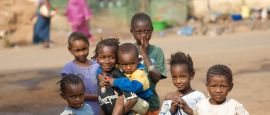Guinea History, Language and Culture
History of Guinea
Modern Guinea formed part of the Ghana Empire and was then incorporated into the Mali Empire, which dominated the region between the 13th and 15th centuries. Portuguese explorers arrived during the mid-15th century and over the next 300 years they, along with the British and the French, made Guinea the centre of a major slave trade.
In 1849, the French declared the Boke region a French protectorate. Then in 1895, the French incorporated the Boke province, the heart of the Guinea republic today, along with adjacent territory, into French West Africa. The region was a single entity comprised mostly of modern-day francophone West Africa, and governed from Dakar.
After the departure of the French political power was assumed by the Democratic Party of Guinea-African Democratic Rally. By 1983, the regime's extreme mismanagement and repressive behaviour had driven an estimated two million people into exile. When the president, Sekou Touré, died in 1984 the army immediately seized power in a bloodless coup led by Colonel Lansana Conté.
The Conté government straight away set about improving badly damaged political and economic links with its West African neighbours. In 1989 Conté unveiled plans for a gradual move towards democratic government. Presidential elections were held in 1993 and won by Conté.
In February 1996, Conté survived an attempted coup, after which he assumed personal control of the country's armed forces. Conté was elected for a third term as President in December 2003 (after first holding a referendum in 2001 that officially removed the two-term limit on presidency). He remained in power until his death in 2008 after which Moussa Dadis Camera seized power in a coup and declared himself the head of a military junta.
In 2009 soldiers brutally attacked a protest killing 157 people and raping women in the streets. Later that year Camera was shot in the head in an assassination attempt and flown out of the country for medical care.
Elections were eventually held in 2010 and won by Alpha Conde. Conde survived a coup attempt in 2011 and was re-elected in 2015.
Did you know?
• The jazz band, Bembeya Jazz National, formed in Guinea after independence and became world-renowned for their Afrobeat rhythms.
• Guinea was the only former French protectorate, which refused to join the French Community on independence.
• There are 24 different ethnic groups in Guinea.




 You know where
You know where